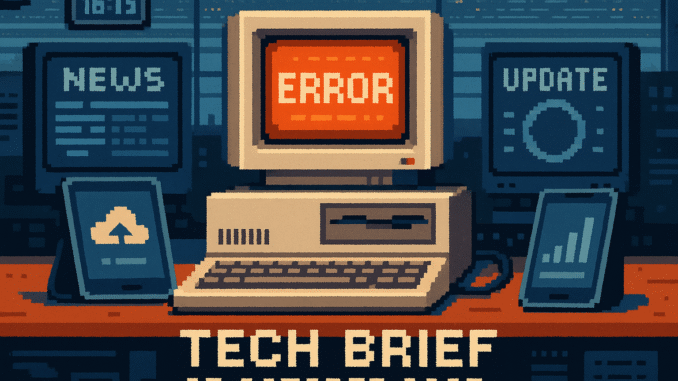
“Tech Brief 25 October 2025” lands on a Friday layered with caution, repair, and a bit of institutional nostalgia. Is British tech repeating old stories or finally learning tough lessons? There is no attempt to wrap everything in one theme today; sometimes, the only link is that we are still here trying to make sense of it.
Missed yesterday’s Tech Brief? Catch up here before diving in.
UK Publishes Supply Chain Security Guidance to Counter Ransomware
What protects the backbone of British infrastructure in 2025? According to new joint guidance from the UK and Singapore, the answer is not a single firewall or policy, but collaboration up and down the supply chain. This document outlines how organisations should plug obvious holes and also coordinate across global partners, a approach that is both practical and daunting. Ransomware attacks have cost UK institutions millions, with incidents such as the 2023 NHS hack still echoing through public memory.
Why does it matter to anyone who has patched a BBS login script or navigated the early days of Virus Bulletin? The guide brings back that old sense of grassroots security, inviting everyone from third-party vendors to local councils into the fold. As ransomware evolves, the UK’s approach has finally shifted from siloed panic to something more communal; however, the guide’s suggestions sound much like the DIY vigilance your local sysop printed out in 1992. Some habits, it seems, do not fade; they just cost a lot more.
Post Office Receives £2 Million to Hunt Down Horizon Records
A hard number: £2 million. That is what the government has set aside for the Post Office to find records related to its long-criticised Horizon system. This is not a boast, just necessity. Up to 1,500 claims are expected from users and staff affected by Horizon system accounting flaws and missing data, and the story is deeply British: the latest chapter in an unglamorous, very public repair job. It comes in the shadow of past government tech failures that linger, from NPfIT to the Horizon scandal.
There’s a cultural undercurrent here for those who spent years coaxing misbehaving systems into action. The Post Office’s root problem is not just a bad interface or poor documentation; it is the cloud of unresolved, sticky errors that make institutions feel haunted. In 1990, this might have ended with a printed errata sheet or a creative hack from a user group. Now, it is an official contract, chasing digital ghosts for a price.
Diverse Tech Careers: When the Best Path Isn’t a Pipeline
Can a winding route count as a roadmap? Modern tech is full of accidental experts and self-taught professionals whose credentials come from curiosity, garage-built hardware, or “borrowed” time on the school’s only 486. Today’s feature in Computer Weekly profiles British tech workers who did not take standard tracks but arrived via community repair shops, night classes, or persistent late-night problem-solving. No “pipeline” is required; sometimes you just keep showing up until someone finally calls you an expert.
It brings back memories of Gen-Xers, especially those who cut their teeth on Amstrad or Acorn kit, carving out roles without waiting for permission or a “skills framework.” In a landscape of policy and certification, these stories remind us that the industry’s foundations are informal and surprisingly open. There is one thing that has not changed: if you know how to solder something back to life at half eleven on a Sunday, chances are you already belong.
From the Wayback Machine
On This Day: 2001 – Microsoft launches Windows XP
Microsoft’s Windows XP arrived on 25 October 2001, shaking up both the home and office. Built on the NT kernel, XP combined professional reliability with colourful consumer features like System Restore and built-in CD burning. The new “Luna” look divided opinions, and Product Activation caused plenty of debate. Despite early resistance, XP’s stability helped it dominate for over a decade, with many institutions clinging to it until long after official support ended. Today, when tech companies worry about migrating away from legacy platforms, XP’s stubborn staying power might explain why the phrase “it just works” still means something; at least when it actually did.
Today’s Big Question
If Tech Brief 25 October 2025 has a moral, it might be this: what happens when systems built for yesterday’s world refuse to stay buried? Whether it is ransomware exploiting old habits or the Post Office digging up long-lost files, today’s news suggests we are still busy mending the past, one patch at a time.
Back soon, extra thermals on. This old flat’s colder than a January server room; makes me wish floppy disks were still hand-warmed.
Missed yesterday’s Tech Brief? Catch up here

Leave a Reply